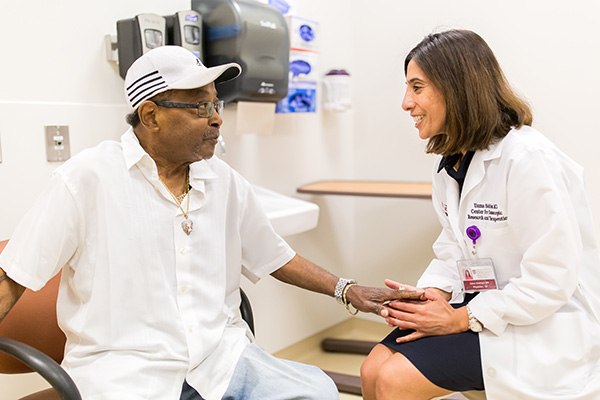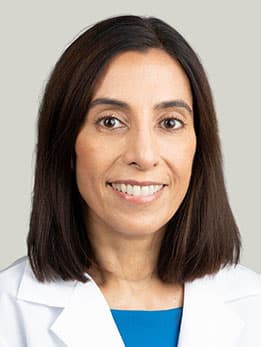Physician brings Chicago man 'back from the dead' after rare bile duct bleeding threatens his life

“They brought me back from the dead,” said Morris Fourte of the life-saving care he received at the University of Chicago Medicine.
In late 2017, Fourte, 72, of Chicago, was admitted to the UChicago Medicine emergency room with severe stomach pain, a low-grade fever and jaundice. Interventional gastroenterologist Uzma Siddiqui, MD, found gallstones in his bile duct and diagnosed cholangitis, or infection of the common bile duct. During treatment, Fourte’s medical team discovered a second issue that threatened his life: he had a rare connection, or fistula, between his artery and bile duct, that was causing excessive bleeding in his bile duct.
“It is extremely rare that a patient would have both conditions,” Siddiqui said. “Our team worked together every step of the way to diagnose his issues and make sure he had a good outcome, which may not have been possible at another hospital.”
Cholangitis occurs when gallstones pass from the gallbladder and then block the flow of bile, a fluid made by the liver to help digest fats. Imaging showed multiple stones in Fourte’s bile duct.
Siddiqui, an expert in the treatment of patients with complex disorders of the gastrointestinal system, removed the stones using endoscopic retrograde cholangio pancreatography (ERCP). This procedure combines X-rays with endoscopy, where a long bendable tube with a light and camera at the end is inserted to give a view of the upper gastrointestinal system, to treat problems of the bile duct. Siddiqui is part of the team at UChicago Medicine’s Center for Endoscopic Research and Therapeutics (CERT), where highly skilled physicians routinely perform such complicated interventional endoscopic procedures.

During the ERCP, blood gushed out of Fourte’s bile duct, and Siddiqui inserted a covered metal stent, which temporarily stopped the bleeding. After this unexpected complication, Siddiqui brought together a team of skilled experts, including surgeon Mustafa Hussain, MD, and interventional radiologist Brian Funaki, MD, who used advanced imaging to find the problem and was able to place small coils into the bleeding vessel to permanently stop the bleeding.
Siddiqui believes that Fourte’s other health issues, including end-stage kidney disease, high-blood pressure, emphysema—a disease of the lungs that makes it hard to breathe—along with chronic steroid use, may have set him up for the fistula. He is currently doing respiratory therapy at UChicago Medicine to prepare for his upcoming gallbladder surgery and credits his care team for getting him back to living his life, including spending time with his eight children and nearly 20 grandchildren.
“I have nothing but high praises for the University of Chicago Medicine team that pulled me through,” Fourte said. “Dr. Siddiqui did a wonderful job. If this happens to me again, I want her on my team.”

Uzma Siddiqui, MD
Dr. Siddiqui is a gastroenterologist with expertise in interventional endoscopy. Her clinical focus is on gastrointestinal oncology and endoscopic ultrasound (EUS).
See Dr. Siddiqui's physician profileCenter for Endoscopic Research and Therapeutics (CERT)
The mission of the CERT program is "to advance patient care through endoscopic discovery and innovation." Our highly trained, expert physicians and nurses live our mission every day, performing more than 2,000 specialized ultrasound and interventional endoscopy procedures annually and ranking among the nation's leaders in progressive techniques.
Learn more about our advanced endoscopy services